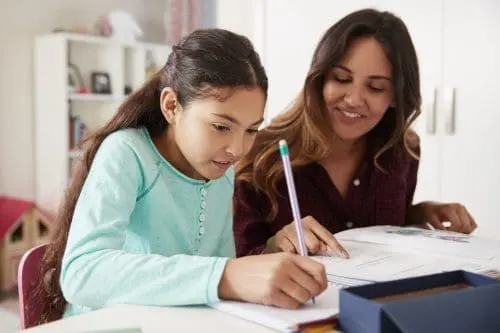by Nicole Young, MSW
Is it just me, or is it getting harder to keep up with life? Some days, it feels like I’m on a treadmill that’s going too fast, but I can’t pause to catch my breath because I’m scared I’ll trip and fall. I think I’ve become so accustomed to this rapid pace that I’ve stopped noticing the stress it creates. That is, until I wake up at 2 a.m. multiple nights in a row from a recurring nightmare about an important meeting or deadline I’ve missed. It’s like those childhood dreams where you show up at school unprepared for a test or can’t find your classroom. When this happens to me, it’s a clear sign that my stress and anxiety have taken over. It’s time to press the reset button.
Dear Nicole, My 9-year-old daughter is sweet and kind, does well in school, and doesn’t have any major behavior issues. Our problem is that everything makes her anxious and nervous. She gets really worried that something will go wrong, she’s forgotten something, or she’s going to make a mistake (and fail). She gets so upset that she can’t think straight. I tell her everything will be fine, but that seems to make her more upset. I’m worried this will get worse as she gets older and faces more pressure. What should I do? – Daniel
Dear Daniel,
You’re on the right track by taking your daughter’s emotions seriously. Anxiety is a natural reaction to anything the brain sees as a “threat,” including stress at home, school, with friends or in the community. Signs of anxiety can include a faster heartbeat and breathing, sweaty palms, tense muscles, light-headedness or an upset stomach. These physical reactions can make us more alert and prepared to do our best in situations like tests or sports. However, they can also be frightening for some children, especially if they experience frequent or intense anxiety. It can lead children to believe that something is wrong with them or something bad will happen. If left alone, these thoughts and feelings can become overwhelming and interfere with daily life. Here are some tips to help your family:
Acknowledge and empathize with your child’s feelings. When children become upset, their “emotional brains” take over, making it hard for them to see the situation and options clearly. Many parents try to reassure their children that everything will be fine, solve the problem or tell them the situation is not really a big problem. While the parents might be right, children are more likely to believe these words once their fears have been acknowledged as real to them. A simple statement such as, “I can see you’re really worried,” or, “I’ve felt that way before,” can have a calming effect.
Ask questions and listen. Try to find out whether something happened recently that caused her to become anxious or nervous. Then ask a few questions to encourage her to express her thoughts and feelings. Listen and continue to acknowledge her feelings, even if you don’t understand or agree with how she views the situation.
Guide your child through problem-solving steps. Help her define the problem or concern, then brainstorm possible ways to handle it. Encourage her to come up with ideas first before offering suggestions. Talk about the pros and cons of each idea, then help her decide which one to try.
Have her practice what she’ll say or do to build her confidence in her ability to handle the situation. After she tries her solution, talk about how it worked and what she would do the next time something similar happens. Over time, this process will help your daughter learn ways to handle stress and anxiety before it becomes overwhelming. Stay calm and patient. Helping children deal with anxiety can add more stress to a family. Use coping strategies yourself, like taking deep breaths, saying positive affirmations, or taking a break. It will help you stay calm and patient, while also modeling healthy coping strategies.
FINAL THOUGHTS: Stress and anxiety are unavoidable parts of everyday life, but they don’t have to take over our lives. Learning to cope with anxiety in childhood is an important life skill that can be developed with time and practice.
 This monthly column provides tips for anyone who is helping raise children, based on the world-renowned Triple P – Positive Parenting Program, available to families in Santa Cruz County. If you have a question or idea for a future column, email me at triplep@first5scc.org.
This monthly column provides tips for anyone who is helping raise children, based on the world-renowned Triple P – Positive Parenting Program, available to families in Santa Cruz County. If you have a question or idea for a future column, email me at triplep@first5scc.org.
Nicole Young is the mother of two children, ages 19 and 23, who also manages Santa Cruz County’s Triple P – Positive Parenting Program, the world’s leading positive parenting program. Scientifically proven, Triple P is made available locally by First 5 Santa Cruz County, the Santa Cruz County Health Services Agency (Mental Health Services Act) and the Santa Cruz County Human Services Department. To find a Triple P parenting class or practitioner, visit http://triplep.first5scc.org, http://www.facebook.com/triplepscc or contact First 5 Santa Cruz County at 465-2217 or triplep@first5scc.org.





